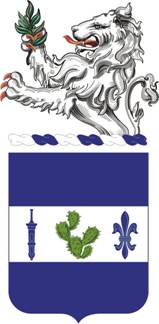151st Infantry Regiment, Indiana Army National Guard: Difference between revisions
Knorrepoes (talk | contribs) m (Text replacement - "{{us}}" to "") |
Knorrepoes (talk | contribs) m (Text replacement - "The Coat of Arms was " to "The arms were ") |
||
| Line 16: | Line 16: | ||
The white fess charged with the Roman sword, cactus, and fleur-de-lis represents the Spanish-American War, Mexican Border, and World War I service, respectively. | The white fess charged with the Roman sword, cactus, and fleur-de-lis represents the Spanish-American War, Mexican Border, and World War I service, respectively. | ||
The | The arms were approved on 1 February, 1932. | ||
[[Literature]]: Image and Information from Wikimedia Commons | [[Literature]]: Image and Information from Wikimedia Commons | ||
[[Category:Military heraldry of the United States]] | [[Category:Military heraldry of the United States]] | ||
[[Category:Army heraldry]] | [[Category:Army heraldry]] | ||
Revision as of 05:31, 28 December 2022
151ST INFANTRY REGIMENT, INDIANA ARMY NATIONAL GUARD
Official blazon
Shield: Barry of three, Azure and Argent, a prickly pear cactus Proper between a sheathed Roman sword and a fleur-de-lis of the first on the second.
Crest: That for the regiments and separate battalions of the Indiana Army National Guard: From a wreath Argent and Azure a demi-lion rampant of the first holding in dexter paw a laurel branch Vert.
Motto: WIDE AWAKE - WIDE AWAKE..
Origin/meaning
The Crest is that for Regiments and Separate Battalions of the Indiana Army National Guard. The shield is blue for Infantry, the original unit designation. The white fess charged with the Roman sword, cactus, and fleur-de-lis represents the Spanish-American War, Mexican Border, and World War I service, respectively.
The arms were approved on 1 February, 1932.
Literature: Image and Information from Wikimedia Commons
